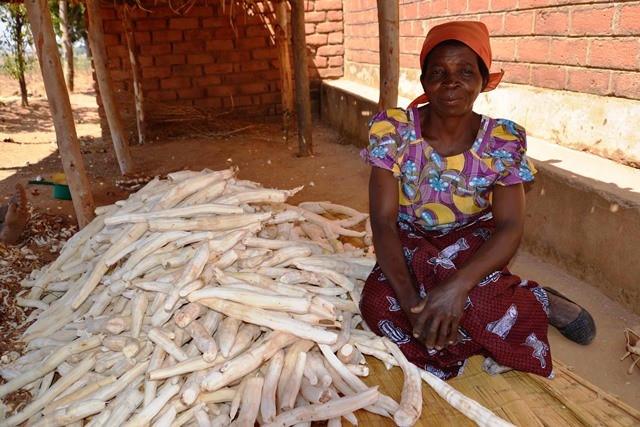
El Niño occurs when the Pacific Ocean warms and disrupts weather around the globe. In Malawi, where the rains were delayed in places by up to two months, the ongoing El Niño has resulted in a severe drought, and led to failed crops for many subsistence farmers. Due to its poverty levels, increasing population, and advanced environmental degradation, Malawi is especially vulnerable to climatic shocks and hard-won development gains are fragile in the face of climatic shocks such as those caused by El Niño.
USAID closely monitors the global impact of the El Niño phenomenon and works to develop resilience strategies. USAID is the largest contributor to the country’s humanitarian response, providing the World Food Program (WFP) with $122 million ($55 million of FY 2015 funds and balance in FY 2016 funds) to date. WFP estimates the total cost of the humanitarian response to be $395 million.
DIRECT RESPONSE
MALAWI VULNERABILITY ASSESSMENT COMMITTEE (MVAC): The 2015/16 El Nino resulted in prolonged drought in most parts of Malawi which led to significant reduction in agriculture production. In June 2016, the MVAC estimated that 6.5 million people will need emergency food assistance by the peak of the next lean season in order to survive. This is more than double the number that required assistance during the last lean season, which concluded in April (2.9 million), and represents nearly 40 percent of the total population. The food assistance will be required from July 2016 to March 2017 in 24 districts. The response is estimated to cost $395 million covering food security, agriculture, education, water and sanitation, heath, nutrition and protection sectors.
DEVELOPMENT FOOD ASSISTANCE PROGRAM (DFAP): Two USAID Development Food Aid Programs (DFAPs), United in Building and Advancing Life Expectations (UBALE) and Pathways to Food Security (Njira) include lean season supplementary food rations to mothers and children under the age of two. These programs are also collaborating with WFP on household identification to ensure that households do not receive double rations.
FEED THE FUTURE: In November 2015, Feed the Future investments responded to the anticipated effects El Niño by supplying short-cycle groundnut seeds to farmers in areas predicted to receive less rainfall, and by providing drought-tolerant maize seeds to over 240 demonstration plots in southern Malawi. Feed the Future also extended its programming into the Chikwawa and Nsanje districts, where improved sorghum seeds are distributed to smallholder farmers.
FAMINE EARLY WARNING SYSTEMS NETWORK (FEWS NET): This program monitors food security conditions and provides timely forecasts on the anticipated impact of El Niño in Malawi and throughout the region. It provides host country and U.S. decision makers with timely, accurate, and actionable information.
INDIRECT RESPONSE
ON-GOING RESILIENCE PROGRAMS
USAID designs its programs to reach highly vulnerable populations with appropriate interventions. The goal is to strengthen the population’s resilience to climatic shocks and increase their access to quality services.
AGRICULTURE: Feed the Future (FTF) strengthens the competitiveness of the soy, groundnut, and orange-fleshed sweet potato value chains and builds the capacity of Malawi’s agriculture sector. FTF activities also promote the use of improved farming practices and technologies, including drought-tolerant seed varieties. FTF’s climate smart agriculture programming improves soil fertility, yields, and ultimately increases household incomes, making farmers more resilient to external shocks. USAID is also working on increasing the availability of quality disease-resistant, early-maturing, drought-resistant quality seed. Feed the Future supports the use of a biological control product to reduce aflatoxin contamination in maize and groundnuts in the fields. This initiative will help curb the buildup of this cancer-causing substance which will help the overall health of the country. To ensure an integrated approach to agriculture, DFAPs collaborate with FTF activities. The DFAPs increase food security through improved agriculture technologies and quality seeds that are distributed through seed fairs.
CLIMATE RESILIENCE: As the current crisis has made clear, Malawi is highly vulnerable to climate variability. USAID’s environment activities and DFAPs strengthen the resilience of vulnerable populations by addressing the main drivers of deforestation, improving land and water management, and improving the capacity of local communities to manage their natural resource base. The DFAPs are implementing community-based disaster risk management to deal with effects of climate change. Most USAID sustainable economic growth (SEG) activities promote the formation of village savings and loans groups. The groups help vulnerable households to increase savings for investment at the beginning of the agricultural season.
HEALTH AND NUTRITION: The effects of El Niño may result in increased cases of malnutrition and leave households with little to spend on health care. USAID activities use methods such as Child Health Days, Community Management of Acute Malnutrition, and nutrition care groups to get health and nutrition messages and services out to the community. These efforts reach a large number of children with vitamin A supplements, de-worming tablets, routine immunizations, and also monitor the nutritional status of infants and children. Village clinics provide a basic package of antenatal care, and village healthcare workers are trained in community case management of malaria, diarrhea, and pneumonia. They also provide services in hard-to-reach areas.
OTHER U.S. GOVERNMENT EFFORTS: USAID works in collaboration with various other U.S. Government agencies to build a more resilient population. The Millennium Challenge Corporation assists communities in flood-prone areas to mitigate the impact of floods, the U.S. Department of Agriculture invests in school feeding, and the U.S. State Department provides support to the refugee population.







Comment
Make a general inquiry or suggest an improvement.